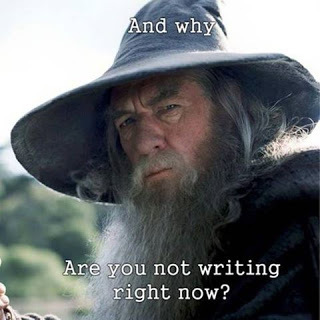
I don’t even know if they still teach parts of speech in grade school anymore, but back in the dark ages when I attended public school it was required learning. Back then they taught me that sentences were all about the noun and the verb, with everything else cast as helpers. And sometimes, those other words don’t help at all. But as a person selecting books for publication, and getting my own work out there, I can say that one of the best ways to upgrade your writing is to upgrade your verbs.
Genre fiction is almost always about the action, one way or another, and that’s what verbs represent. The subject of each sentence, the main noun, is pretty much fixed. How you describe what that person, place or thing is doing is the difference between an interesting statement and a boring one.
The easiest and least interesting verbs to use are forms of the verb to be. You know… it is, you are, they were, etc. Those words simply denote existence, and are almost always the worst choice.
Likewise there are the most common terms for movement that have dozens of cooler synonyms. Like go, for instance. Sure he went home, and maybe he walked home (better) but he could have run, skipped, raced, sauntered, wandered or found his way home in several other ways. He hit the ball but he could have slammed it, whacked it, clobbered it, smashed it… you get the idea.
Here’s a short paragraph I’ve stolen and re-written from a recent submission we received:
A crystal chandelier was overhead and below, the tile floor was black and white. Fresh sunflowers sat on a tea table in the center and beyond it an oak banister went up a marble treaded staircase. She went from this to Barlow’s I thought, she sure as hell wanted out.
Now that is perfectly serviceable prose, and delivers the message – it’s real nice here but she ran away anyway. BUT here’s what the author really wrote:
A crystal chandelier hung above my head and a black and white tiled floor flowed before me. A tea table in the center held fresh sunflowers and beyond it an oak banister led the way up a marble treaded staircase. From this to Barlow’s I thought, she sure as hell wanted out.
I hope you can feel the difference. This is not purple prose, not flowery or wordy. But by choosing better verbs she has made the descriptive passage much more inviting.
So after you’ve laid down your first draft go back and stare at every verb to see if a stronger one is available. This will also help you to eliminate adverbs (helpers that don’t really help your writing) and even prompt you to occasionally slip in a better noun. SO, did she speak softly, or did she whisper? Did the light shine brightly or did it glimmer? And did you write that passage succinctly or did you compose some terse, pithy prose?
 newest »
newest »
 newest »
newest »
 Removing myself for a period of time from writing an outline for each chapter has helped me to rewrite better, simple sentences. The changed sentences use descriptive verbs, without adverbs. Sentences have reduced adjectives, etc. I like Austin's descriptive manner.
Removing myself for a period of time from writing an outline for each chapter has helped me to rewrite better, simple sentences. The changed sentences use descriptive verbs, without adverbs. Sentences have reduced adjectives, etc. I like Austin's descriptive manner.




